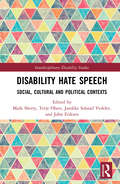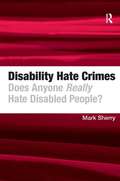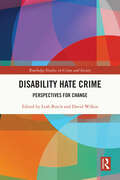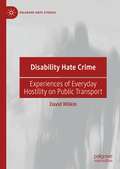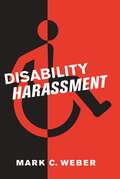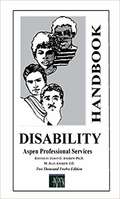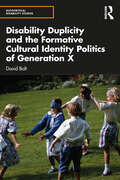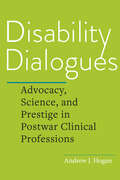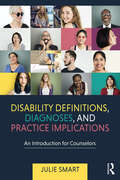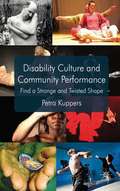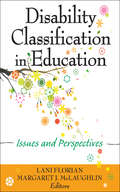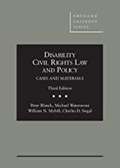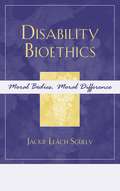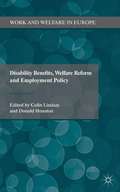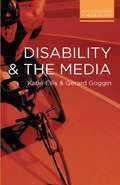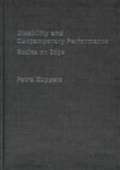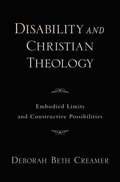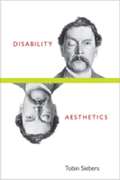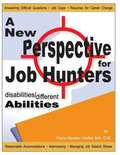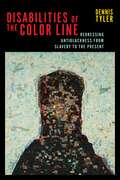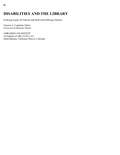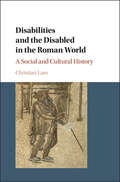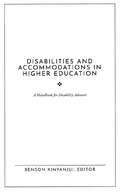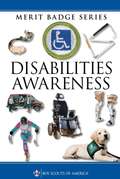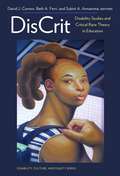- Table View
- List View
Disability Hate Speech: Social, Cultural and Political Contexts (Interdisciplinary Disability Studies)
by Mark Sherry Terje Olsen Janikke Solstad Vedeler John EriksenThis book, the first to specifically focus on disability hate speech, explains what disability hate speech is, why it is important, what laws regulate it (both online and in person) and how it is different from other forms of hate. Unfortunately, disability is often ignored or overlooked in academic, legal, political, and cultural analyses of the broader problem of hate speech. Its unique personal, ideological, economic, political and legal dimensions have not been recognized – until now. Disability hate speech is an everyday experience for many people, leaving terrible psycho-emotional scars. This book includes personal testimonies from victims discussing the personal impact of disability hate speech, explaining in detail how such hatred affects them. It also presents legal, historical, psychological, and cultural analyses, including the results of the first surveys and in-depth interviews ever conducted on this topic in some countries. This book makes a vital contribution to understanding disability hatred and prejudice, and will be of particular interest to those studying issues associated with hate speech, disability, psychology, law, and prejudice.
Disability Hate Crimes: Does Anyone Really Hate Disabled People?
by Mark SherryThis book shows that disability hate crimes do exist, that they have unique characteristics which distinguish them from other hate crimes, and that more effective policies and practices can and must be developed to respond and prevent them.
Disability Hate Crime: Perspectives for Change (Routledge Studies in Crime and Society)
by David Wilkin Leah BurchBringing together perspectives from academics, practitioners, campaigners, and activists, this book explores the victimology of disability hate crime (DHC).For the first time, this book brings together recent academic thought, the stance of those working for the United Nations to further the rights of disabled people, and a helpful toolkit on how to advance the status of the disabled victim of hate crime. Campaigners, support workers, and legal scholars present a tangential approach to revealing the plight of disabled victims and their associates. The book will reveal the expertise required to understand experiences of victimisation and how to help reconstruct the lives of those affected by this type of violence. Never before has a book produced such a nuanced and multidisciplinary approach to discussing disability hate crime.This volume will be useful not only for those academically interested in how disability hate crime is perpetrated but also for scholars who wish to study how to raise awareness and lobby for change. It is essential reading for those engaged with hate studies, victimology, disability, and vulnerable communities, as well as practitioners and campaigners.
Disability Hate Crime: Experiences of Everyday Hostility on Public Transport (Palgrave Hate Studies)
by David WilkinThis book examines the experiences of disabled people on public transport to reveal the everyday abuses that many experience there, and the resilience that they need in order to conduct an ordinary life. This work represents an intertwining of personal journeys, with its author writing from first-hand experience, and now working as one of the leading researchers of disability hate crime (DHC) in the UK. DHC is an under-researched area and the findings in this book have implications beyond the public transport context. This book draws on a sample of 56 victim-participants and includes data drawn from public transport regulators, service operators and staff in the UK. Wilkin argues that established legislation needs to be recognised and implemented by regulatory and local authorities in order to reach equality objectives on public transport. Each chapter is clearly structured, accessibly written and includes key definitions which will speak to practitioners and academics with an interest in victimology, policing, social policy, gender studies, disability studies, migration studies, equality studies and religious studies. This book also examines how effectively authorities and service providers safeguard disabled people on UK public transport and reveals adaptive approaches to researching with disabled people.
Disability Harassment
by Mark C. WeberBuilding on the insights of both disability studies and civil rights scholars, Mark C. Weber frames his examination of disability harassment on the premise that disabled people are members of a minority group that must negotiate an artificial yet often damaging environment of physical and attitudinal barriers. The book considers courts’ approaches to the problem of disability harassment, particularly the application of an analogy to race and sex harassment and the development of legal remedies and policy reforms under the Americans with Disabilities Act (ADA). While litigation under the ADA has addressed discrimination in public accommodations, employment, and education, Weber points out that the law has done little to combat disability harassment. He recommends that arguments based on unused provisions of the ADA should be developed and new legal remedies advanced to address the problem. Disability Harassment also draws on case law to explore special problems of harassment in the public schools, and closes with an appeal to judges and lawmakers for expanded legal protection against harassment.
Disability Duplicity and the Formative Cultural Identity Politics of Generation X (Autocritical Disability Studies)
by David BoltDisability is history and futurity, culture and society, practice and theory, work and play, an immense desire for life by which body and mind are dragged kicking and screaming into each and every new day. Using autocritical discourse analysis, a new hybrid research method that combines aspects of the established methods of critical discourse analysis (CDA) and autoethnography, this book explores the formative cultural identity politics of disability via cultural stations of UK popular culture. These cultural stations include action figures, children’s books, television miniseries, comics, comedy films, teenage drama and sitcoms, the punk rock movement, and alternative comedy. Although the cultural stations range from toys and comics to aggressive music and chaotic sitcoms, all are considered with a focus on the language and tropes of disability. Indeed, most of the works are not remembered as portrayals of disability but the book’s analysis reveals flash if not fleeting representations that, when centralised, clarify patterns of duplicity. Via the language of power, and the power of language, all these texts are found to have contributed to the formative cultural identity politics of disability. It will be of interest to all scholars and students of disability studies, sociology, toy studies, comic studies, humour studies, television studies, popular music studies, gender studies, literary studies, and cultural studies.
Disability Dialogues: Advocacy, Science, and Prestige in Postwar Clinical Professions
by Andrew J. HoganA historical look at how activists influenced the adoption of more positive, inclusive, and sociopolitical views of disability.Disability activism has fundamentally changed American society for the better—and along with it, the views and practices of many clinical professionals. After 1945, disability self-advocates and family advocates pushed for the inclusion of more positive, inclusive, and sociopolitical perspectives on disability in clinical research, training, and practice. In Disability Dialogues, Andrew J. Hogan highlights the contributions of disabled people—along with their family members and other allies—in changing clinical understandings and approaches to disability.Hogan examines the evolving medical, social, and political engagement of three postwar professions—clinical psychology, pediatrics, and genetic counseling—with disability and disability-related advocacy. Professionals in these fields historically resisted adopting a more inclusive and accepting perspective on people with disabilities primarily due to concerns about professional role, identity, and prestige. In response to the work of disability activists, however, these attitudes gradually began to change. Disability Dialogues provides an important contribution to historical, sociological, and bioethical accounts of disability and clinical professionalization. Moving beyond advocacy alone, Hogan makes the case for why present-day clinical professional fields need to better recruit and support disabled practitioners. Disabled clinicians are uniquely positioned to combine biomedical expertise with their lived experiences of disability and encourage greater tolerance for disabilities among their colleagues, students, and institutions.
Disability Definitions, Diagnoses, and Practice Implications: An Introduction for Counselors
by Julie Smart<p>This introductory text defines and describes disability, while providing concrete practice guidelines and recommendations for students in the fields of counseling, social work, and the helping professions. Various specialty areas are explored in detail, including marriage and family counseling, adolescent counseling, addictions counseling, LGBTQ concerns, multicultural counseling, and career counseling. <p>The first three chapters lay the foundations by discussing the demand for counseling services by individuals with all types of disabilities; presenting clinical, legal, medical/biological, and personal definitions of disability; and describing physical, cognitive, and psychiatric disabilities. Next, author Julie Smart examines core beliefs about disability using a range of first-person accounts from experienced counselors. The last six chapters focus on practice guidelines for various aspects of disability—including ethical considerations, societal issues, social role demands, and individual responses—and consider new possibilities for disability counseling professions. <p>With rich case studies woven throughout, as well as valuable information on client needs, disability categorizations, and key Models of Disability, this essential textbook will be useful not only to counseling students but also to professional counselors, social workers, and psychologists.</p>
Disability Culture and Community Performance
by Petra KuppersPerformances in hospices andon beaches; cross-cultural myth making in Wales, New Zealand and the US; communal poetry among mental health system survivors: this book presents a senior practitioner/critic's exploration of arts-based research processes sustained over more than a decade -a subtle engagement with disability culture. "
Disability Classification in Education: Issues and Perspectives
by Lani Florian Margaret J. McLaughlinThis edited volume examines current disability classification systems, the dilemmas educators face in categorizing students with special needs, and alternative options based on recent challenges and trends.
Disability Civil Rights Law And Policy, Cases And Materials (American Casebook)
by Peter Blanck Michael Waterstone William N. Myhill Charles D. SiegalThis casebook examines the development of disability rights law and policy in the United States and abroad and can be used as either a law or graduate school teaching tool. It gives a complete and current treatment of the Americans with Disabilities Act and the ADA Amendments Act, including the background of the statute's passage, definition of disability, discrimination in employment, public services, and public accommodations. It also gives in-depth coverage of other important federal disability discrimination statutes like the Individuals with Disabilities Education Act, Rehabilitation Act, and Fair Housing Amendments Act. This book is unique in that it offers extensive coverage of the rapidly developing area of international disability law, through discussion of the new UN Convention on Rights of Persons with Disabilities and related developments. The authors also offer detailed coverage of current policy issues involving taxation, health policy, and technology. The book has been streamlined significantly since the last edition.
Disability Bioethics: Moral Bodies, Moral Difference
by Jackie Leach ScullyJackie Leach Scully argues that bioethics cannot avoid the task of considering the moral meaning of disability in humans--beyond simply regulating reproductive choices or new areas of biomedical research. By focusing on the experiential and empirical reality of impairment and drawing on recent work in disability studies, Scully brings new attention to complex ethical questions surrounding disability. Impairment is variously considered as a set of social relations and practices, as experienced embodiment, as an emancipatory movement, and as a biomedical phenomenon. In this way, disability is joined to the general late-twentieth-century trend of attending to difference as a significant and central axis of subjectivity and social life.
Disability Benefits, Welfare Reform and Employment Policy
by Colin Lindsay Donald HoustonThis book aims to tackle the issues that are central to understanding and addressing one of the most important employment policy problems facing governments in the UK and beyond: the high number of people of working age claiming 'disability' or 'incapacity' benefits.
Disability And The Media
by Katie Ellis Gerard GogginThis concise, integrated introduction to the complex relationship between disability and the media offers a roadmap to the key areas of participation, access and representation. Bringing together international theoretical work and research on disability, with analysis and examples across a diverse range of media forms – from radio, to news, popular television and new digital technologies – this unique text explores the potential for establishing a more diverse, rich and just media. Providing an approachable but critical introduction to the field, Katie Ellis and Gerard Goggin show how disability – like the closely connected areas of race and gender – is a pervasive issue in how the media represent society.
Disability And Contemporary Performance: Bodies On The Edge
by Petra KuppersDisability and Contemporary Performance presents a remarkable challenge to existing assumptions about disability and artistic practice. In particular, it explores where cultural knowledge about disability leaves off, and the lived experience of difference begins. Petra Kuppers, herself an award-winning artist and theorist, investigates the ways in which disabled performers challenge, change and work with current stereotypes through their work. She explores freak show fantasies and 'medical theatre' as well as live art, webwork, theatre, dance, photography and installations, to cast an entirely new light on contemporary identity politics and aesthetics. <p><p> This is an outstanding exploration of some of the most pressing issues in performance, cultural and disability studies today, written by a leading practitioner and critic.
Disability And Christian Theology: Embodied Limits And Constructive Possibilities
by Deborah Beth CreamerAttention to embodiment and the religious significance of bodies is one of the most significant shifts in contemporary theology. In the midst of this, however, experiences of disability have received little attention. This book explores possibilities for theological engagement withdisability, focusing on three primary alternatives: challenging existing theological models to engage with the disabled body, considering possibilities for a disability liberation theology, and exploring new theological options based on an understanding of the unsurprisingness of human limits. The overarching perspective of this book is that limits are an unavoidable aspect of being human, a fact we often seem to forget or deny. Yet not only do all humans experience limits, most of us also experience limits that take the form of disability at some point in our lives; in this way,disability is more "normal" than non-disability. If we take such experiences seriously and refuse to reduce them to mere instances of suffering, we discover insights that are lost when we take a perfect or generic body as our starting point for theological reflections. While possible applicationsof this insight are vast, this work focuses on two areas of particular interest: theological anthropology and metaphors for God. This project challenges theology to consider the undeniable diversity of human embodiment. It also enriches previous disability work by providing an alternative to the dominant medical and minority models, both of which fail to acknowledge the full diversity of disability experiences. Mostnotably, this project offers new images and possibilities for theological construction that attend appropriately and creatively to diversity in human embodiment.
Disability Aesthetics
by Tobin SiebersDisability Aesthetics ambitiously redefines both 'disability' and 'aesthetics,' showing us that disability is central not only to modern art but also to the way we apprehend (and interact with) bodies and buildings. Along the way, Tobin Siebers revisits the beautiful and the sublime, 'degenerate' art and 'disqualified' bodies, culture wars and condemned neighborhoods, the art of Marc Quinn and the fiction of Junot Díaz---and much, much more. Disability Aesthetics is a stunning achievement, a must-read for anyone interested in how to understand the world we half create and half perceive." ---Michael Bérubé, Paterno Family Professor in Literature, Pennsylvania State University. "Rich with examples of the disabled body in both historical and modern art, Tobin Siebers's new book explores how disability problematizes commonly accepted ideas about aesthetics and beauty. For Siebers, disability is not a pejorative condition as much as it is a form of embodied difference. He is as comfortable discussing the Venus de Milo as he is discussing Andy Warhol. Disability Aesthetics is a prescient and much-needed contribution to visual & critical studies." ---Joseph Grigely, Professor of Visual and Critical Studies, The School of the Art Institute of Chicago. Disability Aesthetics is the first attempt to theorize the representation of disability in modern art and visual culture. It claims that the modern in art is perceived as disability, and that disability is evolving into an aesthetic value in itself. It argues that the essential arguments at the heart of the American culture wars in the late twentieth century involved the rejection of disability both by targeting certain artworks as "sick" and by characterizing these artworks as representative of a sick culture. The book also tracks the seminal role of National Socialism in perceiving the powerful connection between modern art and disability. It probes a variety of central aesthetic questions, producing a new understanding of art vandalism, an argument about the centrality of wounded bodies to global communication, and a systematic reading of the use put to aesthetics to justify the oppression of disabled people. In this richly illustrated and accessibly written book, Tobin Siebers masterfully demonstrates the crucial roles that the disabled mind and disabled body have played in the evolution of modern aesthetics, unveiling disability as a unique resource discovered by modern art and then embraced by it as a defining concept. Tobin Siebers is V. L. Parrington Collegiate Professor of English Language and Literature and Art and Design at the University of Michigan. His many books include Disability Theory and The Subject and Other Subjects: On Ethical, Aesthetic, and Political Identity. A volume in the series Corporealities: Discourses of Disability.
Disabilities/Different Abilities
by Paula Reuben VieilletThis is a hands-on workbook which will help the job hunter who has a disability secure employment. Step by step, this manual guides the job hunter through the vocational process in an honest and positive manner so as to get results. It is designed for individual usage, or in conjunction with a trained professional. The first section, Getting to Know You, addresses self-esteem, personal values and job goal definition and includes motivational strategy. The second section, Facing Workplace Discrimination, reviews application and interviewing functions with a focus on eliminating discrimination in the hiring process. Typical concerns of job hunters are answered in a straightforward and informative manner. The third section, Ready, Set, Go, deals with feelings and concerns regarding returning to work and includes a handy reference guide of available resources for job hunters with disabilities.
Disabilities of the Color Line: Redressing Antiblackness from Slavery to the Present (Crip #5)
by Dennis TylerWinner of the 2023 Phi Beta Kappa Christian Gauss AwardHonorable Mention for the 2022 Robert K. Martin Book Prize from the Canadian Association for American Studies (CAAS)ASALH 2023 Book Prize FinalistReveals how disability and disablement have shaped Black social life in AmericaThrough both law and custom, the color line has cast Black people as innately disabled and thus unfit for freedom, incapable of self-governance, and contagious within the national body politic. Disabilities of the Color Line maintains that the Black literary tradition historically has inverted this casting by exposing the disablement of racism without disclaiming disability.In place of a triumphalist narrative of overcoming where both disability and disablement alike are shunned, Dennis Tyler argues that Black authors and activists have consistently avowed what he calls the disabilities of the color line: the historical and ongoing anti-Black systems of division that maim, immobilize, and stigmatize Black people. In doing so, Tyler reveals how Black writers and activists such as David Walker, Henry Box Brown, William and Ellen Craft, Charles Chesnutt, James Weldon Johnson, and Mamie Till-Mobley have engaged in a politics and aesthetics of redress: modes of resistance that, in the pursuit of racial and disability justice, acknowledged the disabling violence perpetrated by anti-Black regimes in order to conceive or engender dynamic new worlds that account for people of all abilities. While some writers have affirmed disability to capture how their bodies, minds, and health have been made vulnerable to harm and impairment by the state and its citizens, others’ assertion of disability symbolizes a sense of community as well as a willingness to imagine and create a world distinct from the dominant social order.
Disabilities and the Library: Fostering Equity for Patrons and Staff with Differing Abilities
by Clayton A. CopelandDisabilities and the Library helps readers understand the challenges faced by people who are differently abled, both as patrons and as information professionals. Readers will learn to assess their library's physical facilities, programming, staff, and continuing education to ensure that their libraries are prepared to include people of all abilities. Inclusive programming and collection development suggestions will help librarians to meet the needs of patrons and colleagues with mobility and dexterity problems, learning differences, hearing and vision limitations, sensory and cognitive challenges, autism, and more. Additional information is included about assistive and adaptive technologies and web accessibility. Librarians will value this accessible and important book as they strive for equity and inclusivity.
Disabilities and the Disabled in the Roman World: A Social And Cultural History
by Christian LaesAlmost fifteen per cent of the world's population today experiences some form of mental or physical disability and society tries to accommodate their needs. But what was the situation in the Roman world? Was there a concept of disability? How were the disabled treated? How did they manage in their daily lives? What answers did medical doctors, philosophers and patristic writers give for their problems? <P><P>This book, the first monograph on the subject in English, explores the medical and material contexts for disability in the ancient world, and discusses the chances of survival for those who were born with a handicap. It covers the various sorts of disability: mental problems, blindness, deafness and deaf-muteness, speech impairment and mobility impairment, and includes discussions of famous instances of disability from the ancient world, such as the madness of Emperor Caligula, the stuttering of Emperor Claudius and the blindness of Homer.<P> The first scholarly study of the subject in English.<P> Comprehensively engages with literary sources, legal texts, epigraphy and papyrology, as well as with material evidence such as iconography.<P> Adopts an explicitly comparative approach which constantly seeks dialogue with new approaches and studies concerning other periods.
Disabilities and Accommodations in Higher Education: A Handbook For Disability Advisors
by Benson KinyanjuiDISABILITIES AND ACCOMMODATIONS IN HIGHER EDUCATION: A HANDBOOK FOR DISABILITY ADVISORS
Disabilities Awareness (Merit Badge Series)
by Boy Scouts of America StaffBoy Scouts of America Merit Badge Series: Disabilities Awareness.
DisCrit: Disability Studies and Critical Race Theory in Education
by David J. Connor Beth A. Ferri Subini A. AnnammaIn this groundbreaking volume, scholars examine the achievement/opportunity gaps from both historical and contemporary perspectives, as well as the overrepresentation of minority students in special education and the school-to-prison pipeline. Chapters also address school reform and the impact on students based on race, class, and dis/ability and the capacity of law and policy to include (and exclude).
